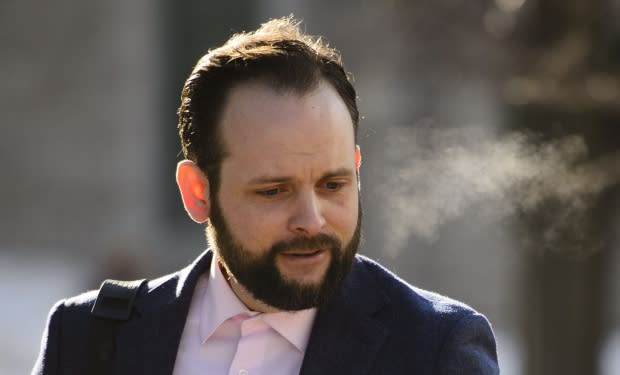Joshua Boyle's 911 call played at his assault trial
At 11:47 p.m. ET on Dec. 30, 2017, Joshua Boyle picked up the phone and dialled 911, prompting Ottawa police to show up at the apartment he shared with his then-spouse and their children.
It was the day Caitlan Coleman was "finally able to walk away from Mr. Boyle" after months of alleged domestic abuse, Crown attorney Meaghan Cunningham told court as Boyle's trial began in Ottawa on Monday.
On Tuesday, Boyle's 911 call was played in Ontario Court.
"My wife is threatening to kill herself," he's heard telling the dispatcher in five minutes of the 911 audio. He says she has an "extreme mental instability" called borderline personality disorder, as well as post-traumatic stress disorder (PTSD) "and a few other things."
But the call was a ruse, the Crown intends to prove — an attempt by Boyle to divert suspicion away from himself and onto someone else.

Hours later, Boyle was arrested and charged with a raft of offences, including public mischief (misleading police with the 911 call and ensuing investigation), assault with a weapon, sexual assault and forcible confinement.
Boyle has pleaded not guilty to all 19 charges, laid a few months after the couple returned to Canada in October 2017 with three children they had while in captivity for five years in Afghanistan and Pakistan.
Listen to the 911 call below. The audio has been edited for length and to protect privacy.
'Did not want to hit her'
Sgt. Shane Henderson was one of the two police officers who responded to Boyle's 911 call.
Boyle greeted Henderson at the door of the unit holding an infant, then told Henderson he and Coleman had been in an argument, and that he "didn't want to drag Caitlan back into the apartment" and "did not want to hit her," Henderson recalled jotting down in his notes.
After Henderson looked for Coleman elsewhere, both inside and outside the apartment building, he came back to the couple's unit to get more details.
Boyle told Henderson that Coleman suffered from a personality disorder, anxiety and PTSD, and that she was stressed after an argument about the kids drawing on the wall. Boyle also talked "about Caitlan as a wife not performing her duties and her roles and responsibilities as a mother," Henderson testified.
Boyle worried about what wife would tell police
Boyle said "he offered to have sex with Caitlan if she wanted to," Henderson went on, and that Boyle told him he asked Coleman to stay in a bedroom to calm down, but he kept the door open and never prevented her from leaving.
Henderson asked if Coleman had a cellphone, to see if they could trace it to find her, and made a note of Boyle grabbing a chair to reach the top of the fridge, where he kept Coleman's flip phone.
"He said he took Caitlan's phone away to make sure she didn't break it, as she had broken phones in the past," Henderson testified.
The officer then got ready to leave and continue searching for Coleman at the hotel where her mother was staying.
"As I left, Boyle told me that he was concerned, as any husband would be, what Caitlan would say to us when we found her," Henderson told court.
Boyle concerned about possible abduction
Before Henderson got to the hotel, he received a call from Boyle just before 1 a.m. Boyle told the officer he believed Coleman had taken her passport and the children's passports, "and that he was now concerned this could be an abduction," Henderson testified.
Henderson and two other officers headed up to Coleman's mother's room and found Caitlan Coleman inside. He testified he asked if she was OK and how she was feeling, and that she asked if Boyle had called the police and if he was accusing her of assaulting the children or being suicidal.
"She then told me that [Boyle] is manipulative," Henderson told court.
After explaining to Coleman that he was worried about her mental health and that she might want to hurt or kill herself, Coleman told him she wasn't suicidal. He then asked her mother if she had any concerns about her daughter, and she replied she didn't, Henderson recalled.
"And then Caitlan started to tell me and the other officers why she left the house that night, and it was not because she was suicidal," he told court.
Investigation shifts

She told Henderson she left to get away from Boyle after multiple threats and physical assaults, including punching and slapping as recently as that evening, and that she was trying to get back to the U.S. with her mother.
Henderson testified he could see no signs of injury on Coleman's face, and that he did not examine her.
Coleman prepared a written statement, and after speaking to Coleman and her mother, Henderson testified: "I did not see any evidence" that Coleman wanted to hurt herself, nor that she suffered from mental illness that could lead her to hurt herself or others.
During Henderson's time with the Colemans, Boyle called Henderson six times and sent four texts, all of which went unanswered because the subject of the investigation was shifting from Coleman to Boyle, Henderson testified.
The case that began as a search for a missing, suicidal person had become a criminal investigation of partner assault.
Henderson and the other officers made the decision to arrest Boyle that same evening, and to take the Colemans with them so they could assume care of the three children once Boyle was in custody.
Boyle visibly upset
They arrived at the apartment at 3:29 a.m. on Dec. 31, 2017. As Henderson testified about the officers picking up the children in order to make the arrest, a visibly upset Boyle tried to leave the courtroom with his father close behind him and, as the accused, was informed by the judge that he couldn't leave.
The judge then ordered a five-minute recess.
When the trial resumed with cross-examination by defence lawyer Lawrence Greenspon, Henderson conceded he hadn't written down his questions and Coleman's replies verbatim in his notes.
The officer also backtracked about when he'd decided the investigation had changed, saying he may simply have missed one or two of Boyle's first unanswered calls to him.
Greenspon noted that the last two Ottawa police chiefs have stated that their officers don't have the proper training and resources to deal with mental health calls. Henderson testified he's received training on how to handle those calls at several points in his career.
Judge Peter Doody is presiding over the trial, which is set to resume Wednesday with the end of Henderson's cross-examination and the beginning of Coleman's testimony.
The 19 charges Boyle faces are:
One count of sexual assault while threatening to use a weapon (ropes)
One count of sexual assault with a weapon (ropes)
One count of uttering a threat to cause death
Nine counts of assault
One count of assault with a weapon (a broomstick)
Three counts of unlawful confinement
One count of administering a noxious substance (the antidepressant Trazodone)
One count of public mischief (misleading a police officer into believing that someone was suicidal and missing, causing the officer to start an investigation, and thereby diverting suspicion away from Boyle)
One count of criminal harassment

